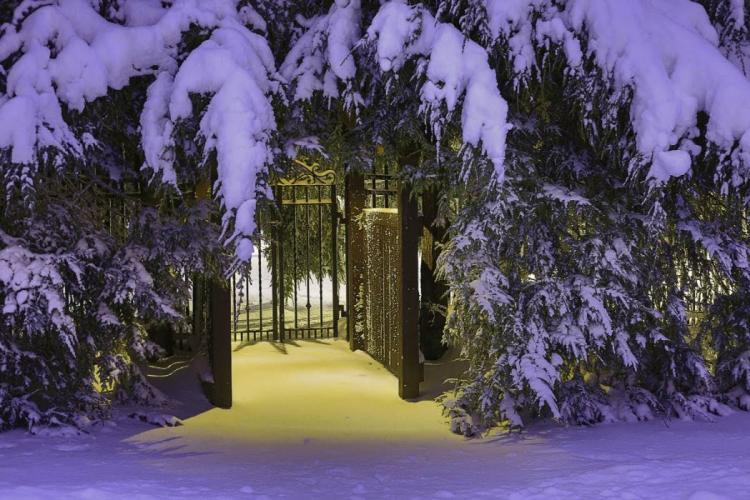“Glory to God in Heaven, and upon earth peace...”
—Luke 2:14
Christmas songs are blaring over loudspeakers in every store you enter. The gift boxes are heaping up. Everybody’s saying it: “Christmas blessings … God bless you at Christmas time … Christmas peace to you and yours … Merry Christmas.” But is there any truth at all to any of this manufactured joy? Or is this, at best, nothing more than an exercise in auto-suggestion: Say it often enough and you’ll think it’s true, whatever the facts to the contrary.
Christians, after all, at least from one perspective, live a very split life. As Paul puts it in one of his letters to the fragile communities of the early church, “Your standards should be different than those around you.” But at Christmas time, those standards can get terribly confusing. The Christian standard says that Christ, our Peace, has been born. But look around you. The other standard, the real public norm, the front page of our daily newspapers, says that there is no such thing as peace anywhere. Instead, we have mass murder in countries we are unfamiliar with and blood baths we have created in Baghdad and Kabul.
So, are we simply kidding ourselves when we put up manger scenes in our public parks, and weigh our churches down with bark-covered, life-size crèches, and decorate the crib sets under our Christmas trees? Will the world ever really come to peace? In fact, is there really any such thing as peace? And, most of all, what do we have to do with it. What are we singing about? Is all of this so-called feast nothing more than a too stark reminder that Karl Marx was right, that religion really is “the opium of the people,” the sedative we sell to help people either to help them survive the worst or to help them deny it?
Neither, really.
If anything, it is living proof that there is such a thing as “peace”—and then there is peace.
One kind of peace is a state of life that is free from chaos and turbulence, from violence and institutionally legitimated death. That kind of peace happens often enough in history to show us that such a thing is possible. But don’t be fooled: that kind of peace can be achieved as easily through force as well as through justice. In that case, little is gained by it.
But there is another kind of peace. This kind of peace does not come either from the denial of evil or the acceptance of oppression. This kind comes from the center of us and flows through us like a conduit to the world around us.
This kind of peace is the peace of those who know truth and proclaim it, who recognize oppression and refuse to accept it, who understand God’s will for the world and pursue it. This kind of peace comes with the realization that it is our obligation to birth it for the rest of the world so that what the mangers and crèches and crib sets of the world point to can become real in us–and because of us—in our own time. That is the kind of Christmas peace we must ourselves seek to be. Then “Merry Christmas” will really mean something.
Thursday, December 1: Peace is not an event; it is a state of mind and an attitude of soul.
Friday, December 2: To be at peace with the world, we must come to see the world differently.
Saturday, December 3: There is no peace in either greed or competition. To be at peace, we must first learn to accept ourselves. Coming to peace with who we are, what we are, what we have and what we do is the spiritual basis for the acceptance of others.
Sunday, December 4: It is true that peace begins with us. The aggressive, violent, destructive people are always persons who are unhappy with themselves. The Talmud puts it this way: “Who takes vengeance or bears a grudge acts like one who, having cut one hand while handling a knife, avenges himself by stabbing the other hand.”
Monday, December 5: It is easy to stop the fighting. It is not easy to make peace. To make peace rather than simply to put an end to our private little wars, we must ourselves want peace with the other.
Tuesday, December 6: The Rule of Benedict teaches us “not to make a false peace.” That means don’t pretend to forgive what still needs to be worked out. To do that simply guarantees that it will start all over again–when you least expect it–and the first wound of it will never really heal.
Wednesday, December 7: It is possible for one person to refuse to make war but it is not possible for one person to make peace. To make real peace it takes two.
Thursday, December 8: To solve an impasse with the other, I need to ask myself what it is in me that is feeding the war. “To create peace,” Maha Ghosananda, the Cambodian Buddhist Monk who began the peace walks through the killing fields there, said, “we must first remove the land mines in our hearts which prevent us from making peace: hatred, greed and delusion.”
Friday, December 9: We must be careful, if we want peace, to refuse to legitimate violence as a solution to our real problems.
Saturday, December 10: When we use violence as an answer to violence, all we manage to do in the end is to become what we hate. “Actions initiated in anger,” Sylvia Boorstein wrote, “perpetuate suffering.”
Sunday, December 11: The philosophers know that simply being tough enough to subdue an adversary–physically, emotionally, verbally—does not guarantee peace. It only assures me that the situation will continue long after the initial struggle ends. “Soft is stronger than hard,” Hermann Hesse wrote, “water stronger than rock, love stronger than force.”
Monday, December 12: If Christmas and the manger remind us of anything, whoever we are, whatever our spiritual tradition, surely it is that each of us is born to be big of heart, big of mind, big of soul. Big enough to bring more into the world than brute force or contention or domination of those meant to be just as big as we.
Tuesday, December 13: It is not enough to have peace. We are meant to extend it to others, to increase the amount of it in the world, to be signs of the quietude it brings to those who spread it.
Wednesday, December 14: Peace is not a noun; it is a verb. It requires us to spend ourselves in its pursuit.
Thursday, December 15: To achieve the peace we say at Christmas time that we want, we must change ourselves. As Dorothy Day wrote once, “As you come to know the seriousness of our situation...we come to realize that things will not be changed simply by words or demonstrations. Rather, it’s a question of living one’s life in a drastically different way.”
Friday, December 16: Peace is not the acceptance of evil. On the contrary, real peace requires resistance to evil. But not in evil ways. “True pacifism,” Martin Luther King, Jr. wrote, “is not non-resistance to evil but nonviolent resistance to evil.… It is rather a courageous confrontation of evil by the power of love.” Which, of course, is what Christmas is all about.
Saturday, December 17: The manger is not a sign of weakness. It is the sign of a kind of strength that uses love rather than force to change the world.
Sunday, December 18: When we come to peace with our own limitations, we come to understand and accept the limitations of others. “As we learn to have compassion for ourselves,” the Buddhist nun Pema Chödrön writes, “the circle of compassion for others becomes wider.”
Monday, December 19: To be peaceful is to be unlike most of modern society. It makes you a candidate, as Abba Antony explained, for the title of public fool. The real question, however–considering the poverty, oppression and domination in this world–is who are the real fools? Better a holy fool than a foolish one.
Tuesday, December 20: Peace in a world bent on war and intent on drawing the rest of us into it is a precious commodity. But not an easy one to achieve. As William Barclay says, “Jesus promised those who would follow his leadings only three things: that they should be absurdly happy, entirely fearless and always in trouble.”
Wednesday, December 21: If we want peace, we need to find out what it is inside ourselves that is obstructing it. “The function of perfection,” St. Augustine wrote, “is to make one know one’s imperfection.”
Thursday, December 22: Do anything you can to avoid war–personal or public. Do everything you can to make peace real. But remember that peace can never come from either fear or threat. Both of those must be dispelled before the trust that is of the essence of peace can possibly break out. Or as Thucydides knew 500 years before the manger: “Peace is an armistice in a war that is continuously going on.”
Friday, December 23: In the midst of chaos, it is nevertheless possible to be at peace because peace comes first from within ourselves, not from outside of us. Those who are not at peace within, would not be at peace in heaven.
Saturday, December 24: Just getting away from the people whom we say bother us does nothing to assure that we will be at peace. “Solitude excludes pleasure,” Samuel Johnson writes, “and does not always secure peace.” As long as the agitation goes on within us, peace can never come–even if we’re the only people left in the world.
Sunday, December 25: It is time to stop defining peace as the absence of war and start defining it as the presence of God.
Monday, December 26: There’s no use looking for perfection in others, let alone ourselves. We might as well just accept both and get it over with. As the Chinese Proverb says, “There are two perfect human beings; one dead, and the other unborn.”
Tuesday, December 27: The manger reminds us that resistance to evil does not require power; it only requires courage. Then peace can finally come. As Arundhati Roy says, “There can be no real peace without justice. And without resistance there will be no justice.”
Wednesday, December 28: At the basis of peace is respect for the traditions, cultures, needs, gifts and good intentions of the other. Anything else is either patronizing or arrogant.
Thursday, December 29: The greatest instrument of peace is language. When our words are kind–however difficult the message may be–peace is possible. When our words are hurtful–however true they may be–the peace between us will never really be real. “Better than a thousand useless words,” the Dhammapada says, “is one single word that gives peace."
Friday, December 30: To bring people to reconciliation, to avoid what is damaging to the other, to bring love where pain has been, to open our arms to the world is to make the manger real. Then we can say without blushing, “May the peace of Christmas be yours.”
Saturday, December 31: “People kill for money or for power,” Anthony de Mello teaches. “But the most ruthless murderers are those who kill for their ideas.” It is not belief that causes war, it is believers who refuse to allow others to hold ideas other than their own.
Let’s Share Our Thoughts
The following discussion questions, Scripture echoes, Journal prompts, and prayer are meant to help you reflect more deeply on The Monastic Way. Choose at least two suggestions and respond to them. You may do it as a personal practice or gather a group interested in sharing the spiritual journey. Once a month The Monastic Way staff will convene a Zoom conference where you can share your insights. Three times a year Sister Joan Chittister will join that Zoom conference to give more input and respond to your questions and ideas regarding one issue of The Monastic Way.
Discussion Questions
1. As a Christmas gift to yourself and to the world take one action on behalf of peace this month. Share your action and why you chose it.
2. Which daily quote in The Monastic Way is most meaningful to you? Why? Do you agree with it? Disagree? Did it inspire you? Challenge you? Raise questions for you?
3. After reading The Monastic Way write one question that you would like to ask the author about this month’s topic.
4. Joan Chittister uses other literature to reinforce and expand her writing. Find another quote, poem, story, song, art piece, novel that echoes the theme of this month’s Monastic Way.
5. How would you describe a “holy fool”? Have you known any? Tell about her or him.
Scripture Echo
In days to come,
They shall turn their swords into plowshares
And their spears into pruning tools.
One nation shall not raise arms against another;
Training for war will be no more.
—Isaiah 2:4Then the wolf will dwell with the lamb,
And the leopard will lie down with the young goat;
The baby will play next to the den of the cobra,
And the toddler will dance over the viper’s nest.
There will be no harm, no destruction
Anywhere in my holy mountain….
—Isaiah 11:6, 8, 9
Write a contemporary song of peace. Begin your vision with the words, “In days to come…”
Journal Prompts
Prompt 1. Here are a few statements from this month’s Monastic Way. Choose one that is most helpful to you and journal with it.
• It is time to stop defining peace as the absence of war and start defining it as the presence of God.
• Real peace requires resistance to evil.
• The greatest instrument of peace is language.
Prompt 2: Spend a few minutes with this photograph and journal about its relationship to this month’s Monastic Way. You can do that with prose or a poem or a song or...
Prayer
O God, open my eyes that I may see the needs of others, open my ears that I may hear their cries, open my heart so that they need not be without comfort. Let me not be afraid to defend the weak because of the anger of the rich. Show me where love and faith and hope are needed, and use me to bring them to these places. Open my eyes and ears that I may, this coming day, be able to do some work of peace for Thee.
—Alan Paton
JOAN CHITTISTER is an internationally known author and lecturer and a clear visionary voice across all religions. She has written more than 60 books and received numerous awards for her writings and work on behalf of peace and women in the church and in society.
KAREN BUKOWSKI, an Erie native, is a nature photographer and former LPGA and PGA Golf Professional who holds a master’s degree in public administration. Visit karenbukowskiphotography.com to find many nature and landscape photographs.

 Artwork: by Karen Bukowski
Artwork: by Karen Bukowski




